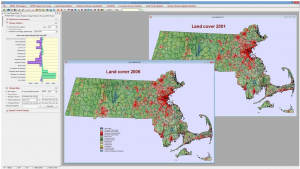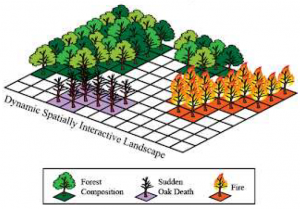Announcement of PANCES Modelling Training Seminar.
Organized by PANCES
Co-organized by Research Institute for Humanity and Nature (RIHN), Japan Society of Civil Engineers (JSCE) -Environmental Systems Research Committee
Date: 10 March (Wed) 2021, 15:00-18:30JST
Venue: Zoom (The Zoom link will be provided to the registered participants two days before the seminar)
Registration: https://forms.gle/5EMTC9KdzFVbGTy66
Leaflet:PDF file
Introduction:
In 2016 the PANCES (Predicting and Assessing Natural Capitals and Ecosystem Services) project was launched to respond to scientific and policy needs, inviting 30 research institutes and more than 100 researchers in Japan (http://pances.net/eng/). The project predicts and assesses future natural capital and ecosystem services (nature's contributions to people) and their natural and social-economic values by building an integrated model of social-ecological systems. Using various models and case studies developed by the project, this training seminar is designed for students and young researchers who are interested in studying future scenarios analysis, land use and cover change analysis, and ecosystem services assessment. The seminar will provide basic theory, modeling methodology, and specific case studies.
There is no participation fee to join this seminar. The project will provide completion certificate (pdf) for those who take this seminar.
Models to be instructed:
1: Land Change Modeler is an innovative land planning and decision support system that is fully integrated into the TerrSet software. With an automated, user-friendly workflow, Land Change Modeler simplifies the complexities of change analysis. Land Change Modeler allows you to rapidly analyze land cover change, empirically model relationships to explanatory variables, and simulate future land change scenarios.
( https://clarklabs.org/terrset/land-change-modeler/ )

2: The LANDIS-II forest landscape model simulates future forests (both trees and shrubs) at decadal to multi-century time scales and spatial scales spanning hundreds to millions of hectares. The model simulates change as a function of growth and succession and, optionally, as they are influenced by range of disturbances (e.g., fire, wind, insects), forest management, land use change. Climate and climate change affect processes throughout the model. LANDIS-II is highly customizable with dozens of libraries ('extensions') to choose from.
( http://www.landis-ii.org/ )

3: InVEST (Integrated Valuation of Ecosystem Services and Tradeoffs) is a suite of models used to map and value the goods and services from nature that sustain and fulfill human life. It helps explore how changes in ecosystems can lead to changes in the flows of many different benefits to people.
( https://naturalcapitalproject.stanford.edu/software/invest )
2021/02/05